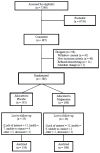Intraoperative magnesium administration does not improve neurocognitive function after cardiac surgery
- PMID: 24105697
- PMCID: PMC3891363
- DOI: 10.1161/STROKEAHA.113.002703
Intraoperative magnesium administration does not improve neurocognitive function after cardiac surgery
Abstract
Background and purpose: Neurocognitive decline occurs frequently after cardiac surgery and persists in a significant number of patients. Magnesium is thought to provide neuroprotection by preservation of cellular energy metabolism, blockade of the N-methyl-D-aspartate receptor, diminution of the inflammatory response, and inhibition of platelet activation. We therefore hypothesized that intraoperative magnesium administration would decrease postoperative cognitive impairment.
Methods: After approval by the Duke University Health System Institutional Review Board, 389 patients undergoing cardiac surgery were enrolled in this prospective, randomized, double-blind, placebo-controlled clinical trial. Subjects were randomized to receive magnesium as a 50 mg/kg bolus followed by another 50 mg/kg infusion for 3 hours or placebo bolus and infusion. Cognitive function was assessed preoperatively and again at 6 weeks postoperatively using a standardized test battery. Mean CD11b fluorescence and percentage of platelets expressing CD62P, which are markers of leukocyte and platelet activation, respectively, were assessed by flow cytometry as a secondary outcome. The effect of magnesium on postoperative cognition was tested using multivariable regression modeling, adjusting for age, years of education, baseline cognition, sex, race, and weight.
Results: Among the 389 allocated subjects (magnesium: n=198; placebo: n=191), the incidence of cognitive deficit in the magnesium group was 44.4% compared with 44.9% in the placebo group (P=0.93). The cognitive change score and platelet and leukocyte activation were also not different between the groups. Multivariable analysis revealed a marginal interaction between treatment group and weight such that heavier subjects receiving magnesium were less likely to have cognitive deficit (P=0.06).
Conclusions: Magnesium administered intravenously during cardiac surgery does not reduce postoperative cognitive dysfunction.
Clinical trial registration url: http://www.clinicaltrials.gov. Unique identifier: NCT00041392.
Keywords: blood platelets; cardiopulmonary bypass; cognition.
Figures






Comment in
-
Response to letter regarding article, "Intraoperative magnesium administration does not improve neurocognitive function after cardiac surgery".Stroke. 2014 Mar;45(3):e45. doi: 10.1161/STROKEAHA.113.004025. Epub 2014 Jan 21. Stroke. 2014. PMID: 24448987 No abstract available.
-
Letter by Derakhshan regarding article, "Intraoperative magnesium administration does not improve neurocognitive function following cardiac surgery".Stroke. 2014 Mar;45(3):e44. doi: 10.1161/STROKEAHA.113.004005. Epub 2014 Jan 21. Stroke. 2014. PMID: 24448993 No abstract available.
References
-
- Hogue CW, Jr, Palin CA, Arrowsmith JE. Cardiopulmonary bypass management and neurologic outcomes: An evidence-based appraisal of current practices. Anesth Analg. 2006;103:21–37. - PubMed
-
- Newman MF, Kirchner JL, Phillips-Bute B, Gaver V, Grocott HP, Jones RH, et al. Longitudinal assessment of neurocognitive function after coronary-artery bypass surgery. N Engl J Med. 2001;344:395–402. - PubMed
-
- Evered L, Scott DA, Silbert B, Maruff P. Postoperative cognitive dysfunction is independent of type of surgery and anesthetic. Anesth Analg. 2011;112:1179–1185. - PubMed
-
- Selnes OA, Grega MA, Borowicz LM, Royall RM, McKhann GM, Baumgartner WA. Cognitive changes with coronary artery bypass graft patients and nonsurgical controls. Ann Thorac Surg. 2003;75:1377–1384. - PubMed
-
- Djaiani G, Fedorko L, Borger MA, Green R, Carroll J, Marcon M, et al. Continuous-flow cell saver reduces cognitive decline in elderly patients after coronary bypass surgery. Circulation. 2007;116:1888–1895. - PubMed
Publication types
MeSH terms
Substances
Associated data
Grants and funding
LinkOut - more resources
Full Text Sources
Other Literature Sources
Medical
Research Materials

